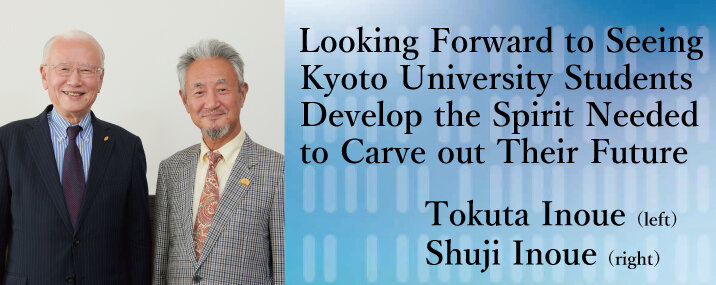Vol.14 Interview with Donors

Tokuta Inoue
Born in Okayama Prefecture in 1939. Graduated from Kyoto University's Faculty of Engineering in 1961. Completed Kyoto University's Master's Program in Mechanical Engineering offered by the Graduate School of Engineering in 1963. Subsequently, joined Toyota Motor Corporation. Was assigned in his late twenties to Toyota Higashi-Fuji Technical Center--which had just been established back then--where he conducted research into engines, developed them, and also worked on exhaust reduction technology. Served as a member of Toyota's board of directors, the Deputy Head of Toyota Higashi-Fuji Technical Center, the Representative Director of Genesis Research Institute Incorporated, which was founded by the Toyota Group in 1996, and a Senior Research Fellow at Tohoku University's New Industry Creation Hatchery Center.
Shuji Inoue
Born in Okayama Prefecture in 1941. Graduated from Kyoto University's Faculty of Pharmaceutical Sciences in 1963. Completed Kyoto University's Master's Program in Medicinal Plant Chemistry offered by the Graduate School of Pharmaceutical Sciences in 1965. Joined Fujisawa Pharmaceutical Co., Ltd. (now Astellas Pharma Inc.). Helped Fujisawa Pharmaceutical expand its business in Europe as the Managing Director and Head of Global Headquarters. Served as the Representative Director and Chairman of R-Tech Ueno, Ltd., (now Sucampo Pharma, LLC) from 2006 to 2009.
Q Looking back to your days at Kyoto University and other experiences,
do you have any message for today's Kyoto University students,
and what kind of efforts do you look forward to seeing the University
make in this 125th anniversary year and after?
Mr. Tokuta Inoue
After leading a free liberal arts life at the Uji and Yoshida campuses, I joined my Faculty's internal combustion engine laboratory. Back then, engines were at the center of scholarly attention. The Faculty comprised scholars at the forefront of each of their fields in mechanical engineering, foremost including my supervisor Professor Fujio Nagao, who all firmly believed that Kyoto University was the best college in Japan. Studying in Kyoto University's internal combustion laboratory provided me with not only an excellent educational environment but also many experiences that helped me throughout my career. In addition, I was surrounded by very talented upperclassmen, who motivated me to study hard to not be left behind.
Another essential aspect of my college life was the Kyoto University Chorus. In the Chorus, I served as the leader of our second tenor section, which helped me make friends with members from other faculties and years of study. In a chorus, each section needs to sing in unison, which requires everyone to connect with their heart, and helping each of their sections do so is the leaders' job. During my years as a research institute head, a research supervisor from another company once asked me my secret to producing many good results, which I realized was my Chorus-day experience of helping my section overcome differences in skills and characteristics to direct its energy toward the same goal. It was a valuable experience that no course could possibly offer and had a great impact on me throughout my life.
I believe one of the reasons Japan currently faces economic decline is that fewer people are willing to make strenuous pioneering efforts. My generation was the first to work on reducing engine exhaust pollution. Although it was a great challenge, the hard work added to our excitement when it finally paid off by enhancing Japan's reputation. I would like Kyoto University students to, after graduating, continue living by principle, rather than pursue promotion and money, even if doing so requires choosing harder paths. Kyoto University students are talented, and I believe those who are talented have great missions. In today's world, money can buy us almost anything. However, that is exactly why I want Kyoto University students to object to such value and lead lives that prove money is not all that matters.
On the other hand, I would like Kyoto University to help its students develop into people with great ambition to care for the world and humanity, rather than their own advancement. I see Kyoto University's 125th anniversary as simply a transit point and look forward to seeing it continue cultivating people who can contribute to developing the future path of humankind.
Mr. Shuji Inoue
I was a member of the Kyoto University Wandervogel Club, so I spent a large part of my college life on mountaineering, which is not to say I neglected my studies. I took many liberal arts courses and remember enjoying the stories told by a young French language instructor who had recently returned from studying abroad. What I learned in my French language course greatly helped me in Europe, where I was transferred. I specialized in medicinal plant chemistry and conducted research into finding new chemical compounds by analyzing medicinal plant components. However, the first company I joined after graduating appointed me not to the research center but the development division. The job of this division was to come up with ideas of what kind of medicines the company should develop next. The world has a diversity of diseases and multiple approaches to treating each of them. Therefore, my job required making the right choice from a number of options, which was similar to finding the correct trail at forks while mountaineering.
After working in the development division, I was put in charge of my company's overseas sales division. When my company first expanded overseas over 40 years ago, it decided to sell its products by itself without partnering with local companies. Back then, Japanese products were not viewed very highly, and with medicine being something we take in our body, consumers seemed hesitant. Nevertheless, we gradually expanded our business across Europe, including Germany, the home of medicines. Pioneers need to carve out their own paths by steering clear of mistakes. It was hard but exciting work because we were the first to take on the challenge.
Students today seem rather introvert and pessimistic about the future. I have actually once heard a student say, "Japan has no future, so there is no use in making any effort," and I was shocked. When I agreed to be transferred overseas, I left with the resolution to serve as a member of our vanguard. Pessimism makes us hesitant of the future. I would like Kyoto University students to have the resolution to carve out their own future by taking on all kinds of challenges.
Many Japanese people must be feeling stuck and helpless, and Japan could drop its place in the world GDP ranking. Japan cannot rely on its population size. Therefore, from here on, it needs to use its knowledge. Japan used to lead the world in producing new products, which it still has the potential to do. All it needs are people with the right knowledge and wit and the spirit to say, "Let's show the world what we're capable of by making something it's never seen." This will require wisdom, instead of cleverness, which is the quality I look forward to seeing Kyoto University help its student develop.
(Interviewed in September 2019)

